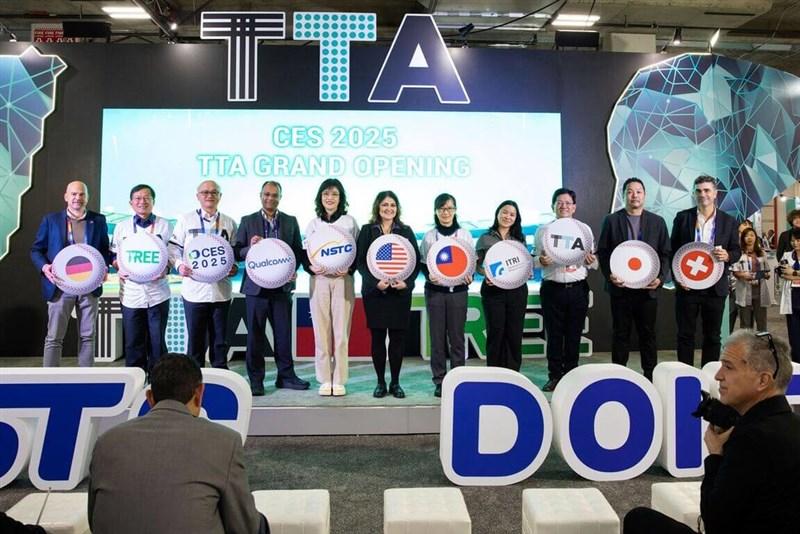A pavilion organized by a tech start-up incubator created by the National Science and Technology Council (NSTC) opened yesterday at the Consumer Electronics Show (CES) in Las Vegas.
The pavilion demonstrates the innovations of 72 Taiwanese start-ups from the Taiwan Tech Arena (TTA), which was initiated in 2018 by the NSTC.
CES senior supervisor Jannene Remondino and Qualcomm Inc vice president Sudeepto Roy attended the opening ceremony, the council said.

Photo courtesy of the National Science and Technology Council
Also present were representatives of the IFA, a consumer electronics show in Berlin; risingSUD, an investment agency in France; the Japan External Trade Organization; and myGlobalVillage Switzerland, a Swiss intelligence specialist, it said.
It was the eighth year that the TTA sent a delegation to the CES, allowing Taiwanese start-ups to compete for market attention with their counterparts from South Korea, Japan, Sweden and Italy.
The NSTC invited TTA to demonstrate their innovations at the pavilion. Start-ups accounted for almost one-third of the total exhibitors at the CES, the council said.
Addressing the opening ceremony, the council's Department of Academia-Industry Collaboration and Science Park Affairs Director-General Andrea Hsu (許增如), who led the TTA delegation to the CES, said the 72 firms covered five sectors: artificial intelligence (AI), digital health, smart cities, sustainability, vehicle tech and advanced mobility.
The achievements showcased by these Taiwanese firms are expected to demonstrate the country's diversified innovation ecosystem, Hsu said.
She added that the Taiwanese participants all have grown based on their AI technologies and are able to let the world know how far they have developed AI applications.
Hsu said Taiwan has become one of the most reliable partners in AI development and the country has set its sights on working with other nations to increase innovations led by AI.
She said the presence of the TTA's firms at the CES is expected to help them seize business opportunities in the global market.
Representatives of more than 30 TTA firms in the pavilion are scheduled to launch roadshows in Silicon Valley on Jan. 14 after the CES ends, to meet with investors and enterprises in the US tech base to lure talent and funds to Taiwan, according to the council.

Hon Hai Precision Industry Co (鴻海精密) is reportedly making another pass at Nissan Motor Co, as the Japanese automaker's tie-up with Honda Motor Co falls apart. Nissan shares rose as much as 6 percent after Taiwan’s Central News Agency reported that Hon Hai chairman Young Liu (劉揚偉) instructed former Nissan executive Jun Seki to connect with French carmaker Renault SA, which holds about 36 percent of Nissan’s stock. Hon Hai, the Taiwanese iPhone-maker also known as Foxconn Technology Group (富士康科技集團), was exploring an investment or buyout of Nissan last year, but backed off in December after the Japanese carmaker penned a deal

SUPPORT: The government said it would help firms deal with supply disruptions, after Trump signed orders imposing tariffs of 25 percent on imports from Canada and Mexico The government pledged to help companies with operations in Mexico, such as iPhone assembler Hon Hai Precision Industry Co (鴻海精密), also known as Foxconn Technology Group (富士康科技集團), shift production lines and investment if needed to deal with higher US tariffs. The Ministry of Economic Affairs yesterday announced measures to help local firms cope with the US tariff increases on Canada, Mexico, China and other potential areas. The ministry said that it would establish an investment and trade service center in the US to help Taiwanese firms assess the investment environment in different US states, plan supply chain relocation strategies and

Three experts in the high technology industry have said that US President Donald Trump’s pledge to impose higher tariffs on Taiwanese semiconductors is part of an effort to force Taiwan Semiconductor Manufacturing Co (TSMC, 台積電) to the negotiating table. In a speech to Republicans on Jan. 27, Trump said he intends to impose tariffs on Taiwan to bring chip production to the US. “The incentive is going to be they’re not going to want to pay a 25, 50 or even a 100 percent tax,” he said. Darson Chiu (邱達生), an economics professor at Taichung-based Tunghai University and director-general of

WASHINGTON POLICY: Tariffs of 10 percent or more and other new costs are tipped to hit shipments of small parcels, cutting export growth by 1.3 percentage points The decision by US President Donald Trump to ban Chinese companies from using a US tariff loophole would hit tens of billions of dollars of trade and reduce China’s economic growth this year, according to new estimates by economists at Nomura Holdings Inc. According to Nomura’s estimates, last year companies such as Shein (希音) and PDD Holdings Inc’s (拼多多控股) Temu shipped US$46 billion of small parcels to the US to take advantage of the rule that allows items with a declared value under US$800 to enter the US tariff-free. Tariffs of 10 percent or more and other new costs would slash such